It’s hard to summarise the sporting life of multi-award-winning journalist Aaron Kearney. Attempts to do so demand more print space than is possible for the average sporting story. Suffice it to say that Kearney has played, watched, reported on, commentated (T.V. and radio), anchored, written about, produced, organized and facilitated more sports and sporting events than most people have had hot dinners. Not just a reporter, producer and writer, Kearney has trained sports journalists and worked extensively on community (sports) development programs in developing nations across the world. Kearney has done almost everything. He has even knocked out John Hopoate in the third round of heavy-weight boxing contest! Athlete, sports expert, sociologist and philosopher Aaron Kearney joined Socrates in the sports bar to shoot the breeze about the impact that Covid19 is having on the sporting world. (He hasn’t really fought John Hopoate… and he would have no more chance of knocking him out than I would. I just made that bit up).
Over to the boys in the bar.
Socrates: Aaron, could you paint me a picture of where you see sport might be in 2021.
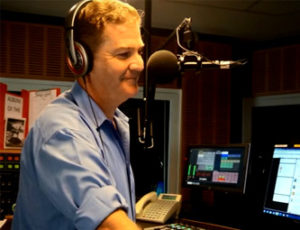
Kearney: I have some micro (from an individual’s point of view) and macro (from the big end of town) thoughts about it.
Starting with the macro, in the international realm where I do most of my work, there is a lot of talk about collaboration in competition. Once upon a time you saw other businesses and other sports as your enemy – your competitor competing in the same space. Even prior to covid19, there was a movement towards this idea of “How can the whole become greater than the sum of its parts?” How can you collaborate with somebody to make a superior experience for both parties as well as your end user and customer? I think that necessity is going to force some of that. I recently heard the head of the FFA say that we must look at the way we can recalibrate our relationships. I think he is talking about collaborations and different ways of doing business. I can imagine a circumstance whereby a summer sport and a winter sport could go to a soft drink sponsor and say here is what a year round multi-demographic program might look like – here are the male and female touchstones – here are our traditional television audience touchstones – here are our tik-tok touchstones and between two sports or three sports or even five sports, here is how we can provide superb coverage for you.
Socrates: Hang on Aaron – you’re talking to a really thick ancient Greek philosopher here. Slow down. What do you mean by multi-demographic and all these touchstones?
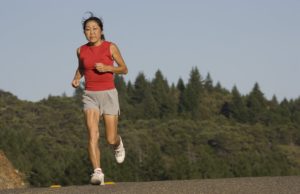
Kearney: Okay. What about an example. Let’s say the organizers of the women’s NRL and a women’s cricket league like the Big Bash put their heads together and approached a car company… say Kia… or Mazda. It doesn’t matter. The point is those sports might see that they can provide a year-round product for the demographics that the car company is trying to reach. Those potential customers might be Tik-Tok users, Facebook users, free to air television watchers… whatever.
Socrates: I think I am starting to get it.
Kearney: Think blue sky a bit, Socrates. A collaborative arrangement could mean almost anything. They could pitch the concept of supporting the sports at grass roots level (sponsoring local cricket and NRL clubs… buying uniforms and paying rego for players) right up to having ownership rights of events that happen throughout the year at the elite level (grand finals, major tournaments and internationals) and covering them across multiple media. Imagine how many Kia’s you could sell with such deep penetration!
“A month back, the idea of Newstart being increased sounded like an absurd idea!”
In the past sports, which are by nature competitive, may not have been so open to collaboration but the current times might change that. To stick to an NRL example, in the current environment, single player hit-ups might not make much of an impact. Employing a team approach with other players being involved (like other sports) and using different methods might produce much more bang for the sponsor’s buck.
A month back the idea of Newstart being increased sounded like an absurd idea. Now, professional athletes, who were once on six figure incomes are being paid their own massive version of the dole (Newstart on steroids). It’s crazy times like right now that makes people completely recalibrate what possible looks like. I can see that this crazy time could make for some collaborations that might have been unthinkable a few months ago.
Socrates: Okay. That’s your vision of the big picture. What about down at the level of the individual. How will the average hoplite on the streets of Athens experience change over the next twelve months.
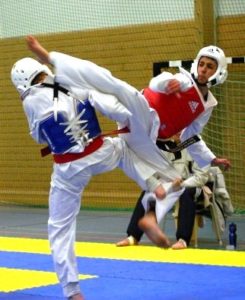
Kearney: On the micro level – what was once seen as a burden in terms of physical health and the social outlet that is sport – what was once seen as a chore, will now be seen as an opportunity and a necessity in ways that it hasn’t before. I saw a joke on Facebook the other day. It pointed out that prior to Covid19 coming, everyone was inside playing their X Box. Now… in the Covid19 world, everyone wants to go outside. A version of that is going to exist! While people running home and streaming Netflix was once considered an appealing option, after eight weeks of streaming Netflix the idea of finding ten mates and forming a futsal team for Saturday nights… or going and finally learning Taekwando at the age of seventy… will suddenly seem, rather than chores (necessities for one’s well-being), will be seen to be an opportunity to engage with the world or your friends socially. Sport, whether organized or just casual is likely to take on a whole new appeal. I think people are going to come at sport with a completely different posture.
Socrates: Wow. So maybe wrestling is going to make a come-back! Any other thoughts on how the world of sport is changing?
Kearney: There is another aspect I can imagine too. At the macro (professional) level and micro (personal) level we are all going to be exploring what the virtual possibilities for sport look like. Over the next few months, we will be learning and training to use the virtual world to enable our sporting lives much more. I see opportunities emerging for E-sports as a mainstream pursuit. I can also see – well, for example, my wife has been doing yoga classes that are being run in England right now and so I can also see a melding of the personal exercise experience and the virtual exercise experience coming out of this as well.
Socrates: Interesting. So… how do you feel about all this change. Good thing or bad?
“They are on a treadmill… and they can’t even remember signing up for it!”
Kearney: One of the huge by-products of all this change, is going to be a whole lot of deep introspection and consideration of what success looks like. Whether you are a businessman who works ninety hours per week – or a mum who works full-time and juggles her work with caring for three young kids – or a family who are considering the pros and cons of aspiring to living in a leafy Sydney North Shore suburb in comparison to the possibilities of living in a country town like Wagga Wagga or a North Coast town like Port Macquarie the shock of what is happening might shake up what people consider to be the measure of success.
This will be a very real human response. Speaking anecdotally, I have been to too many dinner parties and have had too many conversations recently where all people talk about is their mortgage… and which is better Audi, BMW or whatever… and they are on a treadmill that they can’t even remember signing up for. I think that this pandemic will provide a circuit breaker that will enable the reassessment what success looks like in any number of ways… including what health success looks like. I can’t see how this could possibly be a bad thing!
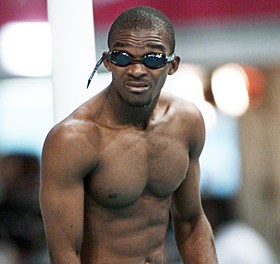
Western humanity may right now be in touch with its mortality in a way that it rarely has before. In some theoretical sense, every time you get behind the wheel of a car you could have a crash. You could. But it’s highly unlikely. Most people reach their sixties, in Australia, without ever having experienced an existential threat in their entire lives! Few people have ever had to wonder whether they will actually still be alive in a month’s time. Yet everyone is wondering just that… right now!
That will have a fundamental shift in how people will approach life in general. I think that there will be a whole heap of – not sure what the right term is – a deformalization or a destructuring approach to things. Bushwalking might get an enormous boost. Tai Chai might get an enormous boost. I think that yoga will, too. There will still be dads who are prepared to spend every cent that they have in the hope that their 14-year-old will some-day play for Arsenal. I don’t think that that phenomenon is going to die. But I do think that what you will see will be a rise in sport as a lifestyle thing and something that demands lifelong participation.
A generation ago you grew up playing cricket (if you were a boy) in summer – then some football code (in winter) and you played to your absolute ability until you were about 25 and they you gradually petered down the grades until you were thirty five. After that you sat and drank for the rest of your life. That was the basic operational model. It’s not completely without its merits. When it stops being about you at the elite level, then kids come along and so you refocus onto them and you maintain the social stuff through drinking and staying around the club. When I was a boy, in the US you had a spectator culture and a player culture. The people who were filling the stands at an NFL game may never have strapped on a helmet in their entire life. In Australia, however, a far greater number of people spectating at the cricket or the AFL had played it at some level. We had a much more participatory base. I think that that has gradually eroded in recent years. If you did a survey at Big Bash cricket (recently) you would have found that far fewer people had ever picked up a cricket bat than you would have found at a test match a generation ago. Perhaps that will swing back. Perhaps participation in sports and healthy lifestyles will become important again. I do think there will now be some engagement with sport as a way of life in a way that has been quite different to recent years. That has to be a positive!
“We will see the behemoth taken down a peg!”
Another implication could be – well if you go to Fiji for example, they all talk about rugby… and how it owns everything, and it is the behemoth – and how everything else lives in its shade. In England, they all say the same thing about football. If you go to India, they say the same thing about cricket. I do think that we will see the behemoth taken down a peg and perhaps the second tier becoming – well sport will become slightly less deep and slightly wider as a phenomenon.

So much of those traditional structures (with a one or two dominant sporting codes) have come from broadcast deals and the broadcast deal model is breaking down as well. The idea that AFL and Channel 7 will hold hands and walk off into the distance while selling slots to Hungry Jack’s – well that is an increasingly out-moded model on every level.
I am hoping that one of the things that will come out of this is that we will flatten the sports celebrity pyramid a little bit. In Taekwondo, for example, nobody who reads this story will be able to name two Taekwondo players who will go to this year’s Olympics (well next years Olympics now) – but the same person could probably name ten professional cricketers or five AFL players. In my experience in the world of sport, the Venn diagram of the most interesting people in sport and the most famous people in sport do not intersect at all. I am hoping that as part of all this, we might lose that cult status for the top end sports and look a little wider and be a little more interested in some of those second tier sports because they do have interesting people doing interesting things and are deserving of much more of our attention. We have learned this through the Paralympics squad. Kurt Fearnley is way more interesting than most members of our national athletics squad. Probably more interesting than most members of our swimming squad as well.
Socrates: Was Eddie the Eagle (from years ago), the English ski jumper, a portend of this?
Kearney: Yes. Eric the Eel (Eric Moussambani, Olympic swimmer from Equatorial Guinea) was another example. Funnily enough I am just working on another story that is related. Its about a young guy from Vanuatu who looks like being that country’s first Olympic swimmer. He has just recovered from Leukemia. He may struggle to be competitive but, I guarantee that he will be one of the stories of the Tokyo 2020 Olympics. It is interesting that we can recall the names of these people off the top of our heads, yet we would struggle to remember any of the medal winners in the events in which they competed. The idea that interest should only lie in the elite of the top end, most well-funded, sports is ludicrous. I am hoping that we will see a little bit of dissipation of that. That will only be a good thing. I am a believer in diversity in all aspects of life – in the less monocultural you are, in every sense of the word. Lately we have been learning how interesting some of the female athletes are and what they are bringing to the table. And let’s not forget, the straight, white males… from traditionally low-profile sports!
The reason why I got interested in the non-elite aspects of sport, after working at the pointy end of sport for nearly two decades, is because I realized that what happened at the elite end of sports. In the elite sports you get identified at twelve or thirteen then get put into a bubble – given a weights and nutrition program – and while the para-Olympians and female athletes of the world are out learning and living life, you are locked in the gym and drinking protein shakes and pumping iron so that by the time you get to twenty five you are a far fitter and maybe superior athlete but you are not a more interesting person.
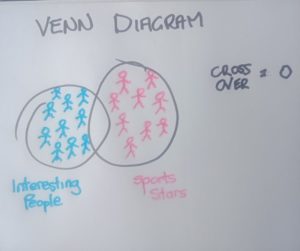
Socrates: In a short period of time you have shown how plenty of positives could come out of a new world of sport. Thanks for that. What do you think individuals should do to enable them to make positive sporting change in their lives throughout this health crisis period?
Kearney: I would love to see people embrace this time as a circuit breaker. Completely reassess your relationship with your sport. Run a bit of a SWOT (strengths, weaknesses, opportunities, threats) analysis of what sport is in your life. With the inability to go and play organized sport – with the restricted ability to go and do exercise – without any professional sport on your television, I encourage people to genuinely take a moment and ask themselves, “What is it that I miss right now” and “What am I not missing, in all of that”. People might find that there is quite a bit of wisdom and revelation. I don’t have a prescriptive answer. Maybe the thing that you are missing is….? Maybe every Friday night you had an appointment with your twelve-year-old boy to go and watch the A League and you discover that that leaves a huge hole in your life. That is a revelation! Good stuff! Maybe, you discover that you have been caught up in the scandal, the BS, the gossip and the melodrama of it all and you don’t miss that in your life one little bit! Take that beyond this as well. Good. That is a revelation, too. Perhaps you considered your daily run as a chore… as a burden to bear – but maybe you are desperately missing what that brings to you – to your body – to your mind – to your soul – to your freedom. Good. Take that beyond this. I encourage everybody to take advantage of this circuit breaker as a moment of examination.
We spend our whole lives on the treadmill of existence. This forced change on every single one of us – nobody is in their normal right now – well, there has never been a better time to make a habit… and never been a better time to break a habit.
Just like his CV, the list of ideas that Aaron Kearney has about the future world of sport (as a result of the Covid19 shut down) is enormous. Just a few of the ideas that jump out from his chat with Socrates are collaboration, recalibration, virtual sport, restructuring, re-evaluating, the knocking down of sports celebrity just a notch or two and the possible adoption of sport as a lifestyle thing rather than a burden. Much is possible, he believes. But to take advantage of the changes that are possible, Kearney hopes that everyone will treat Covid19 as a circuit-breaker that will allow them to re-evaluate their lives and plan for more productive and pleasurable sporting futures.
Leave a Reply